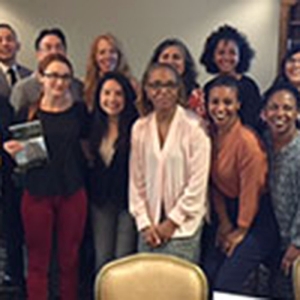Seeking Creative Solutions to Homelessness
June 28, 2017- Students
- Alumni
The Department of Social Change and Innovation at the USC Suzanne Dworak-Peck School of Social Work convened a social change lab experience aimed at finding creative solutions to the problems faced by homeless individuals.
On April 7th, the Activating Community & Policy Responses to Homelessness social change lab experience at USC’s Davidson Center had three objectives: to highlight the need for social work engagement in policy practice; to examine community and policy responses to homelessness; and to co-create recommendations with stakeholders for effective policy practice and advocacy for the homeless population.
Organized by the Department of Social Change and Innovation (SCI), which strives to prepare students to lead bold, large-scale solutions to social problems, the lab brought together a group of approximately 100 students, professors, practitioners and community members to listen, learn and engage with one another.
The Social Change Lab Experience
Born out of the learning objectives of a policy, advocacy and social change course taught by Renée Smith-Maddox, clinical associate professor and SCI’s vice-chair, Smith contends that social labs serve as ideal platforms to address complex social challenges. The objectives of this type of lab are threefold:
1)To bring together diverse participants drawn from different constituencies to work and act collectively;
2)To create a portfolio of promising solutions that reflect an experimental nature; and
3)To address the root causes of why things aren’t working.
Social lab organizers facilitated these objectives by opening the event to “guest thinkers,” a collective of advocates who presented their ideas, fostered critical conversations, designed solutions and engaged with the diverse group of participants referred to as “social change designers.”
The perspectives presented by the panelists on the root causes of homelessness gave way to dialogue about the roles that race, class, economics and media play in our ability to address homelessness. Thoughts were shared on the realities of data collection, law enforcement, and the politics surrounding overcrowded prisons and jails.
Beyond USC
Smith-Maddox issued a call to action toward the end of the event for the social lab platform to go beyond the university and out into the streets and public consciousness.
“SCI’s social lab represents a new way of bringing together a diverse group to develop a portfolio of solutions to solve homelessness,” she said. “The next step is to test the solutions in the real world, use the data to further refine the solutions, test them again, and curate more social labs.”
For a glimpse at the social change lab experience, click here.
To reference the work of our faculty online, we ask that you directly quote their work where possible and attribute it to "FACULTY NAME, a professor in the USC Suzanne Dworak-Peck School of Social Work” (LINK: https://dworakpeck.usc.edu)
